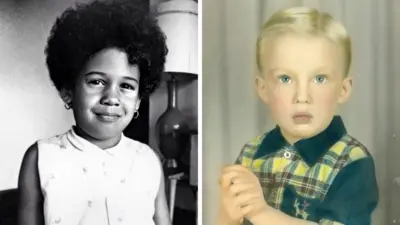We've updated our Privacy and Cookies Policy
We've made some important changes to our Privacy and Cookies Policy and we want you to know what this means for you and your data.
Longer beaks in UK great tits 'down to garden feeders'
Image source, Getty Images
The British love of feeding birds may have caused great tits to evolve longer beaks than their counterparts in Europe, according to an academic study.
The study compared the DNA of more than 3,000 birds in the UK and the Netherlands and established "genetic differences" in terms of beak lengths.
Differences evolved over a short period and could be down to higher numbers of garden bird feeders in the UK, it said.
The RSPB said it may also be one reason for rising great tit numbers in the UK.
According to the research paper, , Britons spend twice as much on bird feeders than their counterparts in mainland Europe.
It estimated that people in the UK spend £334m a year on "supplementary feed" for birds, whereas those in mainland Europe spend £167m.
Increasing numbers
It also compared the beak length of tits in Wytham Woods, Oxfordshire, with those in Wageningen, in the Netherlands and tracked how long they spent at automated bird feeders.
The average UK great tits has a 0.3mm longer beak than its European counterparts, the study established.
Oxford University researchers have recorded the beak sizes of great tits in Wytham Woods for 70 years - and say they have seen a substantial increase in growth since the 1970s.
Those with longer-beaked gene variants were more successful at reproducing in the UK.
Image source, Getty Images
The study was conducted by researchers at Oxford University, Sheffield University, the University of East Anglia (UEA) and the Netherlands Institute of Ecology.
UEA's Dr Lewis Spurgin said: "It's certainly true that birds who have adapted to better access food will be in better condition generally, and so better able to reproduce and outperform others without that adaptation."
He added: "Although we can't say definitively that bird feeders are responsible, it seems reasonable to suggest that the longer beaks amongst British great tits may have evolved as a response to this supplementary feeding."
RSPB spokesman Martin Fowlie said: "As our countryside has changed over the decades, our birds have responded in a variety of ways.
"Great tits numbers have increased fairly steadily since the 1960s and this new study may shed light on why and how this has happened."
Top Stories
More to explore
Most read
Content is not available








